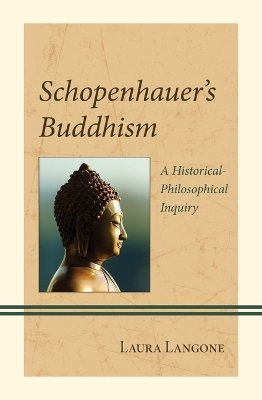
Schopenhauer's Buddhism
A Historical-Philosophical Inquiry
Seiten
2024
Lexington Books/Fortress Academic (Verlag)
978-1-6669-6950-4 (ISBN)
Lexington Books/Fortress Academic (Verlag)
978-1-6669-6950-4 (ISBN)
In a letter from May 10, 1852 Adam von Doß, Schopenhauer declared himself a Buddhist. This book is the first study to do justice to Schopenhauer’s passion for Buddhism, reconstructing the notions of Buddhism he acquired through his Buddhist readings as well as their influence on his thought.
In a letter from May 10, 1852, Adam von Doß, Arthur Schopenhauer declared himself to a Buddhist. From 1825 until his death, he never stopped searching for more information on Buddhism, with his thirst for knowledge of it growing over time. Schopenhauer’s Buddhism: A Historical-Philosophical Inquiry is the first study to do justice to Schopenhauer’s passion for Buddhism, reconstructing the notions of Buddhism he acquired through his readings on Buddhism as well as their influence on his thought. Laura Langone examines what Buddhism meant for Schopenhauer, what kind of Buddhism Schopenhauer had in mind, and how Buddhism shaped his philosophy. This book examines how the assimilation of Buddhist tenets through his Buddhist sources led him to incorporate the Buddhist concept of palingenesis into his philosophical system, which introduced a radically new metaphysical framework. Ultimately, Schopenhauer’s incorporation of Buddhist palingenesis illustrates how Buddhism deeply spurred him to develop new and innovative ideas previously unthinkable in Western philosophy.
In a letter from May 10, 1852, Adam von Doß, Arthur Schopenhauer declared himself to a Buddhist. From 1825 until his death, he never stopped searching for more information on Buddhism, with his thirst for knowledge of it growing over time. Schopenhauer’s Buddhism: A Historical-Philosophical Inquiry is the first study to do justice to Schopenhauer’s passion for Buddhism, reconstructing the notions of Buddhism he acquired through his readings on Buddhism as well as their influence on his thought. Laura Langone examines what Buddhism meant for Schopenhauer, what kind of Buddhism Schopenhauer had in mind, and how Buddhism shaped his philosophy. This book examines how the assimilation of Buddhist tenets through his Buddhist sources led him to incorporate the Buddhist concept of palingenesis into his philosophical system, which introduced a radically new metaphysical framework. Ultimately, Schopenhauer’s incorporation of Buddhist palingenesis illustrates how Buddhism deeply spurred him to develop new and innovative ideas previously unthinkable in Western philosophy.
Laura Langone is Marie Skłodowska-Curie postdoctoral fellow in ethics and applied ethics at the University of Verona.
Introduction
Chapter 1: Schopenhauer’s Philosophy and Readings on Buddhism until 1818: The Early Years
Chapter 2: From 1818 until 1844: Religion, Genius, and Nirvana
Chapter 3: From 1850 Onwards: Asceticism, Negation, and the Ultimate Reality
Chapter 4: The Legacy of Schopenhauer’s Buddhism: Wagner and Nietzsche
Conclusion
Appendix: Further Reading
Bibliography
About Author
| Erscheinungsdatum | 10.07.2024 |
|---|---|
| Reihe/Serie | Contemporary Studies in Idealism |
| Sprache | englisch |
| Maße | 158 x 235 mm |
| Gewicht | 454 g |
| Themenwelt | Geisteswissenschaften ► Philosophie ► Geschichte der Philosophie |
| Geisteswissenschaften ► Philosophie ► Östliche Philosophie | |
| Geisteswissenschaften ► Philosophie ► Philosophie der Neuzeit | |
| Geisteswissenschaften ► Religion / Theologie ► Buddhismus | |
| ISBN-10 | 1-6669-6950-8 / 1666969508 |
| ISBN-13 | 978-1-6669-6950-4 / 9781666969504 |
| Zustand | Neuware |
| Informationen gemäß Produktsicherheitsverordnung (GPSR) | |
| Haben Sie eine Frage zum Produkt? |
Mehr entdecken
aus dem Bereich
aus dem Bereich
eine Geschichte der Zuversicht von Homer bis zum Klimawandel
Buch | Hardcover (2024)
C.H.Beck (Verlag)
CHF 39,20
die kolonialen Wurzeln der französischen Theorie
Buch | Hardcover (2024)
Matthes & Seitz Berlin (Verlag)
CHF 41,90


